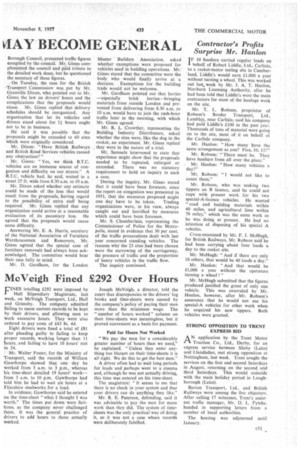McVeigh Fined £292 Over Hours
Page 81

If you've noticed an error in this article please click here to report it so we can fix it.
FINES totalling £292 were imposed by Hull Stipendiary Magistrate, last week, on McVeigh Transport, Ltd., Hull and Grimsby. The company admitted failing to cause current records to be kept by their drivers, and allowing men to work excessive hours. They were also ordered to pay costs of £43 8s. 4d.
Eight drivers were fined a total of £81 after pleading guilty to failing to keep proper records, working longer than 11 hours, and failing to have 10 hours' rest in 24.
• Mr, Waiter Foster, for the Ministry of Transport, said the records of William Gawthorpe showed that one day he worked from 3 a.m. to 3 p.m., whereas his time-sheet detailed 19 hours' work— from 3 a.m. to 10 p.m. Gawthorpe had told him he had to wait six hours at a Flintshire steelworks for a load.
In evidence, Gawthorne said he entered on the time-sheet "what I thought I was worth." The times put down were fictitious, as the company never challenged them. It was the general practice of drivers to add hours to those actually worked. Joseph McVeigh, a director, told the court that discrepancies in the drivers' log hooks and time-sheets were caused by the company's policy of paying their men more than the minimum wage. The " number of hours worked" column on their time-sheets was meaningless, but it proved convenient as a basis for payment.
Paid for Hours Not Worked "We pay the men for a considerably greater number of hours than we need," he explained. "Unless they enter anything too blatant on their time-sheets it is all right. We do this to get the best men."
A driver often had to wait long periods for loads and perhaps went to a cinema and, although he was not actually driving, this time was entered on his time-sheet.
The magistrate: "It seems to me that there is no check in your system and that your drivers can do anything they like."
Mr. R. E. Paterson, defending, said it was advisable to pay the men for more work than they did. The system of timesheets was the only practical way of doing it, so it was not a case where records were deliberately falsified.




























































































































































































































































